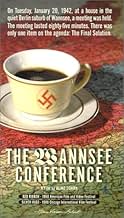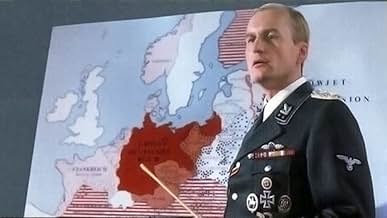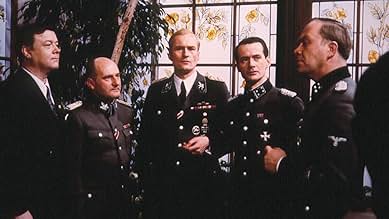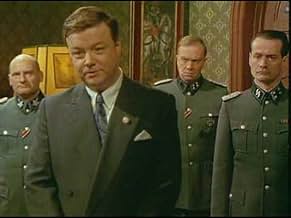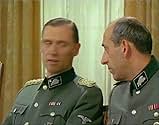Die Wannseekonferenz
- TV Movie
- 1984
- 1h 27m
IMDb RATING
7.7/10
1.4K
YOUR RATING
At the Wannsee Conference on January 20, 1942, senior Nazi officials meet to determine the manner in which the so-called "Final Solution to the Jewish Question" can be best implemented.At the Wannsee Conference on January 20, 1942, senior Nazi officials meet to determine the manner in which the so-called "Final Solution to the Jewish Question" can be best implemented.At the Wannsee Conference on January 20, 1942, senior Nazi officials meet to determine the manner in which the so-called "Final Solution to the Jewish Question" can be best implemented.
Friedrich G. Beckhaus
- Heinrich Müller
- (as Friedrich Beckhaus)
Hans-Werner Bussinger
- Martin Luther
- (as Hans W. Bussinger)
Werner Asam
- Heydrich's Adjutant
- (uncredited)
- Director
- Writer
- All cast & crew
- Production, box office & more at IMDbPro
Featured reviews
I second the "fly on the wall" comment, this one almost has a cinema verite feel to it. One thing that impressed me was the business-like feel to, no table thumping speeches proclaiming loyalty to the Fuehrer or railing about the "Jewish Problem." Instead a group of second and third rank officials-important cogs in a machine but people little known outside their particular spheres-are discussing how to implement the orders of their superiors. In some respects it's almost like a sales meeting, I recall Heydrich says to one participant "We're taking it off your hands" and at the end he telephones Himmler and says "Our position was accepted across the board.", again, like a sales representative telling his boss that they've won the Big Contract. Frightening way to look at it but that's the way it was.
(Note: Over 500 of my movie reviews are now available in my book "Cut to the Chaise Lounge or I Can't Believe I Swallowed the Remote!" Get it at Amazon.)
What I want to do here is to note that The Wannsee Conference is a German language film with white English subtitles. Sometimes the subtitles are superimposed over a white background and the words disappear. That is why state of the art subtitles are yellow so that they don't get lost in the background. Otherwise the subtitles are very good, translating what needs to be translated and ignoring the extraneous.
I also want to note that the somewhat miraculous script by Paul Mommertz is very much like a stage play with most of the action essentially confined to one set with the various players delivering their lines as the camera focuses on them, much as a spotlight might. I say "miraculous" because Mommertz forged his screenplay from the banal, bureaucratic and often euphemistic language used by the historical Nazis as they formulated the so-called "Final Solution." How to make such material dramatic was the problem Mommertz and Director Heinz Schirk faced. They achieved the nearly impossible through the subtle use of what I might call everyday "reality intrusions": the dog barking, the vainglorious Reinhard Heydrich tripping over a briefcase as he is posturing as the grand architect and fuhrer of the Holocaust, the stenographer flirting (and Heydrich's calculated, chilling affirmative response), the greedy drinking, the "Nazi rally" thumping of the table, the turf wars, the boorish jokes, etc. These served to highlight by contrast the horror that these men were so bureaucratically entertaining. Note too that when the stenographer asks if a verbatim report is desired, she is told that a detailed report will suffice. Thus the dumb brute reality could be edited later in a George Orwellian manner to further bureaucratize and euphemize what they were doing.
What a truly verbatim report might have revealed is the point of this film.
This is a work of art, and I want to say that real art, to the extent that it is didactic, fails. If the artist tries to teach a lesson or show us the way and the light through a human story, to that extent he or she loses control and becomes an advertiser, a propagandist, a preacher. We as audience or readers become not participants anymore but objects. A work of art is always a two-way street of participation between the artist and those viewing the art. We might agree with the message or we might not, but we are no longer equal participants in the experience.
Yet what a work of art does is demonstrate a human truth through form. It is almost always an emotional truth. The Greeks emphasized tragedy because they understood the cathartic emotional experience that tragedy brings. What Mommertz and Schirk have done is present the truth as best they could discover it, and then they ran the closing credits. What we as audience experience depends on how well we participated, and what we brought as human beings to the experience. How well we concentrate, how aware we are of what is going on, how alert--these too are important. The Swannsee Conference is a demanding film, but it is surprising how quickly it moves, how engaged we become. The tension is not in what will happen at the end, of course. Instead the tension is in how it happens. We are held in thrall of discovering the essential nature of this most horrific and incredible evil done by the Nazis. And what we find out is that it was above all else banal and bureaucratic.
This is its essence: the dehumanization of the objects upon which the evil is worked. It can be done no other way. It has been said that for good men to do evil it takes religious commitment. For ordinary men it is necessary to dehumanize. When Stuckart complains that women and children are being killed, he is told, "Women and children are Jews too."
What I want to do here is to note that The Wannsee Conference is a German language film with white English subtitles. Sometimes the subtitles are superimposed over a white background and the words disappear. That is why state of the art subtitles are yellow so that they don't get lost in the background. Otherwise the subtitles are very good, translating what needs to be translated and ignoring the extraneous.
I also want to note that the somewhat miraculous script by Paul Mommertz is very much like a stage play with most of the action essentially confined to one set with the various players delivering their lines as the camera focuses on them, much as a spotlight might. I say "miraculous" because Mommertz forged his screenplay from the banal, bureaucratic and often euphemistic language used by the historical Nazis as they formulated the so-called "Final Solution." How to make such material dramatic was the problem Mommertz and Director Heinz Schirk faced. They achieved the nearly impossible through the subtle use of what I might call everyday "reality intrusions": the dog barking, the vainglorious Reinhard Heydrich tripping over a briefcase as he is posturing as the grand architect and fuhrer of the Holocaust, the stenographer flirting (and Heydrich's calculated, chilling affirmative response), the greedy drinking, the "Nazi rally" thumping of the table, the turf wars, the boorish jokes, etc. These served to highlight by contrast the horror that these men were so bureaucratically entertaining. Note too that when the stenographer asks if a verbatim report is desired, she is told that a detailed report will suffice. Thus the dumb brute reality could be edited later in a George Orwellian manner to further bureaucratize and euphemize what they were doing.
What a truly verbatim report might have revealed is the point of this film.
This is a work of art, and I want to say that real art, to the extent that it is didactic, fails. If the artist tries to teach a lesson or show us the way and the light through a human story, to that extent he or she loses control and becomes an advertiser, a propagandist, a preacher. We as audience or readers become not participants anymore but objects. A work of art is always a two-way street of participation between the artist and those viewing the art. We might agree with the message or we might not, but we are no longer equal participants in the experience.
Yet what a work of art does is demonstrate a human truth through form. It is almost always an emotional truth. The Greeks emphasized tragedy because they understood the cathartic emotional experience that tragedy brings. What Mommertz and Schirk have done is present the truth as best they could discover it, and then they ran the closing credits. What we as audience experience depends on how well we participated, and what we brought as human beings to the experience. How well we concentrate, how aware we are of what is going on, how alert--these too are important. The Swannsee Conference is a demanding film, but it is surprising how quickly it moves, how engaged we become. The tension is not in what will happen at the end, of course. Instead the tension is in how it happens. We are held in thrall of discovering the essential nature of this most horrific and incredible evil done by the Nazis. And what we find out is that it was above all else banal and bureaucratic.
This is its essence: the dehumanization of the objects upon which the evil is worked. It can be done no other way. It has been said that for good men to do evil it takes religious commitment. For ordinary men it is necessary to dehumanize. When Stuckart complains that women and children are being killed, he is told, "Women and children are Jews too."
Far above the bathetic histrionics of Kenneth Branagh in the recent "Conspiracy", this crisply chilling, almost real-time reenactment is among the most convincing works of historical evocation on celluloid.
Not so much because its overall interpretation is historically valid: as I noted in my review of "Conspiracy", there are grave doubts whether the Wannsee meeting can bear anything like the watershed significance historians imputed to it between c. 1960 and 1980. More recent research has pointed to the Conference being more or less what the one remaining "Protokoll" (summary minutes) stated: a second-level pow-wow of bureaucrats to arrange for the deportation of Jews to the German-occupied East, not a master plan for their destruction cooked up by leading Nazis.
But that is by the way. "Wannseekonferenz" ably conveys the peculiar ethos of German (by no means all Nazi) officials and soldiers in the pivotal years of World War Two, when the nation seemed to be on top of Europe but was already getting jitters about its staying power. As the Interior Ministry's moderate Dr Stuckart, between wipes of his nose, points out: neither the British Empire nor the Soviet Union has yet been defeated, America is about to join in (the date is a month after Pearl Harbor) and there is danger in sweeping assimilated Jews and mixed-race people out of the Reich. Some will escape to become mortal enemies of it when they might be co-opted. Other participants crudely call for total banishment of Jewry from the Altreich and the Polish "Generalgouvernement", grumbling about disease; but there are war-production and morale arguments on the other side, and the uniforms who start by seeming to spring wholesale evacuation on the suits as a fait accompli- Heydrich and "my Jewish consultant, Eichmann"- are willing to ponder exemptions.
All this is a far cry from the Goldhagenesque "eliminationist antisemitism" uncritically portrayed in "Conspiracy". The German film is a more plausible picture of the clashes and compromises, the tired banter and one-upmanship, the relief of dirty jokes and the solemn courtesies one would expect of a gaggle of Teutonic bureaucrats who don't feel as assured of victory as they have to pretend. The film is little more than facial expressions and dialogue, batted to and fro across the table; but every actor is right inside his part. The sense of a warped community is potent, and the prowling encirclement by Heinz Schirk's camera reinforces this solidarity instead of just trying to fluff up the monotony of a bunch of men (and one shockable stenographer) talking.
Dietrich Mattausch looks far more like the real Reinhard Heydrich- tall, elegant fencer and violinist with a streak of treachery- than stocky little Branagh. His unfailing politeness, with a hint of cold steel underneath, is more convincing than Branagh's Demon King. This man knows what he wants, but his chairmanship is skilfully emollient.
Gerd Bockmann's Eichmann is assiduous and dispassionate like the real Adolf E, who had no great personal animus towards Jews but was determined to get ahead in his sordid profession of "dispatcher". Peter Fitz as Stuckart, the Jonah of the gathering, hints at distaste for the whole business while manfully arguing a pragmatic case for letting sleeping dogs lie. Among the smaller parts, Martin Luttge as Major Dr Rudolf Lange- intellectual turned persecutor in an SS Special Action Group- stands out for his affectation of rough, half-reluctant practicality, telling civilian papershufflers the score.
Inevitably a few embroideries have crept in: Heydrich's pursuit of the secretary, Lange's dog, the contemptuous anecdote about the Papal Nuncio. As if tacitly admitting the lack of hard evidence for orchestrated genocide from the minutes, the screenplay chucks in a throwaway line: Heydrich speaks of finding a new way of killing Jews fast by "learning to take the Fuhrer literally". Stuckart tells Dr Kritzinger that this refers to a "Mein Kampf" passage about how the Great War could have been won if subversive, high-ranking German Jews back home had been held under poison gas. We are supposed to infer a whiff of Zyklon B from this; but as is clear in context, Hitler meant that those Jews should have had to inhale British poison gas as front-line soldiers, like himself.
Such gaseous garnishings were probably required to make the film an accepted part of the curriculum in the guilt-ridden German system of historical re-education. But they do not seriously detract from this superbly atmospheric chamber piece.
Not so much because its overall interpretation is historically valid: as I noted in my review of "Conspiracy", there are grave doubts whether the Wannsee meeting can bear anything like the watershed significance historians imputed to it between c. 1960 and 1980. More recent research has pointed to the Conference being more or less what the one remaining "Protokoll" (summary minutes) stated: a second-level pow-wow of bureaucrats to arrange for the deportation of Jews to the German-occupied East, not a master plan for their destruction cooked up by leading Nazis.
But that is by the way. "Wannseekonferenz" ably conveys the peculiar ethos of German (by no means all Nazi) officials and soldiers in the pivotal years of World War Two, when the nation seemed to be on top of Europe but was already getting jitters about its staying power. As the Interior Ministry's moderate Dr Stuckart, between wipes of his nose, points out: neither the British Empire nor the Soviet Union has yet been defeated, America is about to join in (the date is a month after Pearl Harbor) and there is danger in sweeping assimilated Jews and mixed-race people out of the Reich. Some will escape to become mortal enemies of it when they might be co-opted. Other participants crudely call for total banishment of Jewry from the Altreich and the Polish "Generalgouvernement", grumbling about disease; but there are war-production and morale arguments on the other side, and the uniforms who start by seeming to spring wholesale evacuation on the suits as a fait accompli- Heydrich and "my Jewish consultant, Eichmann"- are willing to ponder exemptions.
All this is a far cry from the Goldhagenesque "eliminationist antisemitism" uncritically portrayed in "Conspiracy". The German film is a more plausible picture of the clashes and compromises, the tired banter and one-upmanship, the relief of dirty jokes and the solemn courtesies one would expect of a gaggle of Teutonic bureaucrats who don't feel as assured of victory as they have to pretend. The film is little more than facial expressions and dialogue, batted to and fro across the table; but every actor is right inside his part. The sense of a warped community is potent, and the prowling encirclement by Heinz Schirk's camera reinforces this solidarity instead of just trying to fluff up the monotony of a bunch of men (and one shockable stenographer) talking.
Dietrich Mattausch looks far more like the real Reinhard Heydrich- tall, elegant fencer and violinist with a streak of treachery- than stocky little Branagh. His unfailing politeness, with a hint of cold steel underneath, is more convincing than Branagh's Demon King. This man knows what he wants, but his chairmanship is skilfully emollient.
Gerd Bockmann's Eichmann is assiduous and dispassionate like the real Adolf E, who had no great personal animus towards Jews but was determined to get ahead in his sordid profession of "dispatcher". Peter Fitz as Stuckart, the Jonah of the gathering, hints at distaste for the whole business while manfully arguing a pragmatic case for letting sleeping dogs lie. Among the smaller parts, Martin Luttge as Major Dr Rudolf Lange- intellectual turned persecutor in an SS Special Action Group- stands out for his affectation of rough, half-reluctant practicality, telling civilian papershufflers the score.
Inevitably a few embroideries have crept in: Heydrich's pursuit of the secretary, Lange's dog, the contemptuous anecdote about the Papal Nuncio. As if tacitly admitting the lack of hard evidence for orchestrated genocide from the minutes, the screenplay chucks in a throwaway line: Heydrich speaks of finding a new way of killing Jews fast by "learning to take the Fuhrer literally". Stuckart tells Dr Kritzinger that this refers to a "Mein Kampf" passage about how the Great War could have been won if subversive, high-ranking German Jews back home had been held under poison gas. We are supposed to infer a whiff of Zyklon B from this; but as is clear in context, Hitler meant that those Jews should have had to inhale British poison gas as front-line soldiers, like himself.
Such gaseous garnishings were probably required to make the film an accepted part of the curriculum in the guilt-ridden German system of historical re-education. But they do not seriously detract from this superbly atmospheric chamber piece.
In 1942, the wealthy district of Wannsee played host to a gathering of high-ranking officials of the Nazi party. Led by SS-Obergruppenführer Reinhard Heydrich- considered by many to be Hitler's natural successor- the group are there for one purpose: to discuss the method by which they will make the Third Reich free of Jews. As they debate their options, analysing the situation as they see it, the men consider many fiendishly methodical methods of murder, showing themselves to be completely morally bereft in their quest for a final solution.
Directed by Heinz Schirk, 'The Wannsee Conference' is a gripping account of the titular meeting, offering much insight into the personalities and attitudes within the Third Reich. A made for TV movie, it is based on the minutes of the real conference, and boasts strong dialogue and perceptive characterisation from screenwriter Paul Mommertz. His characters are believable, villainously banal and systematic in their approach; making the film all the more impactful.
Heydrich and the others, regarding Jews as subhumans on the level of vermin, contemplate mass murder with the casual air of businessmen deciding on their lunch orders. Their discussions about who they consider Jewish, or half-Jewish, makes for fascinating viewing, offering viewers insight into their heinous mindset. Schirk's film shows how the bureaucratization of genocide transformed the unthinkable into the executable. The film meticulously depicts the process by which a group of seemingly civilized men could rationalize and organize the systematic slaughter of millions. The stark, cold meeting room becomes a chilling echo chamber of complicity, where the veneer of legality and procedure masks the monstrous reality of their plans.
By stripping away the dramatic excess often associated with the portrayal of Nazis in media, the film presents a more disturbing truth: that the Holocaust was a product of seemingly mundane administrative decisions made by men who believed they were simply solving a problem. This realization is perhaps the film's most haunting contribution to the historical narrative, leaving viewers to ponder the depths of human depravity and the importance of vigilance in the face of ideology run amok.
Visually, it is filmed as if it were a play, with static shots, minimal camera movement and a focus on dialogue and performance, emphasizing the claustrophobic atmosphere of the conference room and reflecting the oppressive nature of the subject matter. The production design is austere and functional, with an attention to historical accuracy that lends authenticity to the setting. The use of real-time filming, mirroring the actual duration of the Wannsee Conference, creates a sense of immediacy and tension, as viewers are made to feel as if they are there witnessing the events unfold.
Dietrich Mattausch leads the cast as Heydrich, making him seedily suave and chillingly charismatic. Calculating and persuasive, his controlled delivery and cold gaze capture the chilling resolve of a man orchestrating genocide. Gerd Böckmann is similarly impressive as the reserved Adolf Eichman, giving an understated and subtle performance; his matter-of-fact tone and clinical precision revealing the horrifying casual composure with which these men approached the extermination of millions. Peter Fitz does strong work as Wilhelm Stuckart, who has a strange and twisted sense of his own morality, conveying both the intellectual arrogance and the moral bankruptcy of his character; adding another layer of depth to the film's exploration of complicity.
Furthermore, Harald Dietl and Martin Lüttge also shine as Afred Meyer and Rudolf Lange, respectively, highlighting the power dynamics at play and the uncomfortable ease with which they discuss mass murder. Additionally, in the small but pivotal role as the secretary taking down the minutes, Anita Mally subtly embodies the overlooked cog in the Nazi bureaucratic machine. Devoid of any visible emotion or moral conflict, her dutiful transcription of the conference's proceedings encapsulates the terrifying ordinariness that can accompany evil deeds.
Informative and captivating, Heinz Schirk's 'The Wannsee Conference' is an important and effective made for TV movie, documenting a turning point in history. Featuring strong dialogue from Paul Mommertz, this retelling of the titular event explores the situation and characters involved with nuance and insight. Boasting fine cinematography from Horst Schier and authentic production design, as well as powerhouse performances from all in the cast, the film stands as a stark reminder of the banality of evil and the ease with which humanity can slip into darkness.
Directed by Heinz Schirk, 'The Wannsee Conference' is a gripping account of the titular meeting, offering much insight into the personalities and attitudes within the Third Reich. A made for TV movie, it is based on the minutes of the real conference, and boasts strong dialogue and perceptive characterisation from screenwriter Paul Mommertz. His characters are believable, villainously banal and systematic in their approach; making the film all the more impactful.
Heydrich and the others, regarding Jews as subhumans on the level of vermin, contemplate mass murder with the casual air of businessmen deciding on their lunch orders. Their discussions about who they consider Jewish, or half-Jewish, makes for fascinating viewing, offering viewers insight into their heinous mindset. Schirk's film shows how the bureaucratization of genocide transformed the unthinkable into the executable. The film meticulously depicts the process by which a group of seemingly civilized men could rationalize and organize the systematic slaughter of millions. The stark, cold meeting room becomes a chilling echo chamber of complicity, where the veneer of legality and procedure masks the monstrous reality of their plans.
By stripping away the dramatic excess often associated with the portrayal of Nazis in media, the film presents a more disturbing truth: that the Holocaust was a product of seemingly mundane administrative decisions made by men who believed they were simply solving a problem. This realization is perhaps the film's most haunting contribution to the historical narrative, leaving viewers to ponder the depths of human depravity and the importance of vigilance in the face of ideology run amok.
Visually, it is filmed as if it were a play, with static shots, minimal camera movement and a focus on dialogue and performance, emphasizing the claustrophobic atmosphere of the conference room and reflecting the oppressive nature of the subject matter. The production design is austere and functional, with an attention to historical accuracy that lends authenticity to the setting. The use of real-time filming, mirroring the actual duration of the Wannsee Conference, creates a sense of immediacy and tension, as viewers are made to feel as if they are there witnessing the events unfold.
Dietrich Mattausch leads the cast as Heydrich, making him seedily suave and chillingly charismatic. Calculating and persuasive, his controlled delivery and cold gaze capture the chilling resolve of a man orchestrating genocide. Gerd Böckmann is similarly impressive as the reserved Adolf Eichman, giving an understated and subtle performance; his matter-of-fact tone and clinical precision revealing the horrifying casual composure with which these men approached the extermination of millions. Peter Fitz does strong work as Wilhelm Stuckart, who has a strange and twisted sense of his own morality, conveying both the intellectual arrogance and the moral bankruptcy of his character; adding another layer of depth to the film's exploration of complicity.
Furthermore, Harald Dietl and Martin Lüttge also shine as Afred Meyer and Rudolf Lange, respectively, highlighting the power dynamics at play and the uncomfortable ease with which they discuss mass murder. Additionally, in the small but pivotal role as the secretary taking down the minutes, Anita Mally subtly embodies the overlooked cog in the Nazi bureaucratic machine. Devoid of any visible emotion or moral conflict, her dutiful transcription of the conference's proceedings encapsulates the terrifying ordinariness that can accompany evil deeds.
Informative and captivating, Heinz Schirk's 'The Wannsee Conference' is an important and effective made for TV movie, documenting a turning point in history. Featuring strong dialogue from Paul Mommertz, this retelling of the titular event explores the situation and characters involved with nuance and insight. Boasting fine cinematography from Horst Schier and authentic production design, as well as powerhouse performances from all in the cast, the film stands as a stark reminder of the banality of evil and the ease with which humanity can slip into darkness.
A fantastic film that needs to be released domestically on DVD. For the people who don't mind reading subtitles, this is a very, very good version of the more recent "Conspiracy". There is something more to be offered here by the fact that German actors are playing the roles. I do very much like Kenneth Branagh's performance as the manipulative Hydrich (most captivating since David Warner's double performance in "Holocaust" and "Hitler's SS, Portrait of Evil").
The film, which covers in real time the conference at Wansee where the framework of the "Final Solution" was set, is amazing. The methodical way in which it is handled, shows the real danger of evil when it it's perpetration is done on in a methodical/business like manner.
I think this film is a lesson for whomever thinks that the sins of the past can not be repeated in a modern society!
The film, which covers in real time the conference at Wansee where the framework of the "Final Solution" was set, is amazing. The methodical way in which it is handled, shows the real danger of evil when it it's perpetration is done on in a methodical/business like manner.
I think this film is a lesson for whomever thinks that the sins of the past can not be repeated in a modern society!
Did you know
- TriviaAt the time of the film's production, SS-Oberführer Dr Gerhard Klopfer was the only living attendee of the Wannsee Conference. He died on January 29, 1987 at the age of 81.
- GoofsAdolf Eichmann is shown in the film wearing a Waffen-SS infantry officer's uniform complete with the SS runes unit patch. Eichmann was in fact a security police colonel and therefore should have displayed a blank security service collar patch with green police piping.
- Quotes
Adolf Eichmann: There were women... children...
Reinhard Heydrich: Women and children are Jews too.
- ConnectionsRemade as The Conference (2022)
Details
- Release date
- Countries of origin
- Languages
- Also known as
- Hitler's Final Solution: The Wannsee Conference
- Filming locations
- Production companies
- See more company credits at IMDbPro
Contribute to this page
Suggest an edit or add missing content

